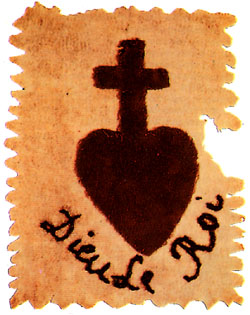The Hidden Rebellion is a docudrama produced and directed by Daniel Rabourdin, and written by Mr. Rabourdin and Matthew Donlan, that tells the story of the Guerre de Vendée, the War in the Vendée (pronounced von-DAY), which was a reaction against the anti-clericalism and totalitarianism of the French Revolution.
The Vendée is a department in west-central France, and during the Revolution (1789-1799) sentiment there turned sharply against the intellectuals and bureaucrats in Paris who, in their desire to fabricate human perfection, demanded an end to nearly all aspects of traditional life, most especially Catholicism. Between 1793 and 1796, the Vendeans rose up against the government. Clashes between the people and the French army ensued, and the brutality was sickening. The Hidden Rebellion provides a fair – if one-sided – history of the uprising.
But in the famous phrase of historian Barbara Tuchman (she was referring specifically to the 14th century), the War in the Vendée is also a “distant mirror.” In that historic conflict, we can see prefigured the battles of our own time. The Jacobin highbrows in Paris looked upon the religiosity of the French people in much the same way Washington, D.C. intellectuals disparage people of faith today.
As in most docudramas, the testimonies of contemporary historians are interspersed with reenactments of historical events. The acting and production are earnest, but I’m a jaded moviegoer, and the impression given by The Hidden Rebellion’s dramatic sequences is of a student film project – and not out of NYU or UCLA but maybe a top-notch Catholic secondary school. Good, in other words, but not ready for Academy Award consideration.

I’ve often objected to gore in films (see “Burning Men: A Review of Hacksaw Ridge”), but The Hidden Rebellion harks back to Production Code-era movies in which a man could get run through with a sword without blood being spilled. In those films, there was usually some passionate acting, whereas in The Hidden Rebellion lines of people headed for the guillotine are about as animated as folks waiting to have their photos taken at the DMV.
This does not, however, diminish the film’s importance. How can one not esteem a film that includes among its historical witnesses the great Edmund Burke (1729-1797)? It is good to recall that not only did Burke see through the horrors of the Revolution (his scathing, epochal, brilliant Reflections on the Revolution in France was published in 1790 when the French Revolution was mere months old). He also favored a British invasion of France to drive the Jacobins from power. And the counterrevolutionary upheaval in the Vendée seemed to him the perfect opportunity for intervention, which is what he proposed to Prime Minister William Pitt (the Younger). Alas, it did not happen.
Stéphane Courtois, editor of the acclaimed Black Book of Communism, and a professor at the Catholic University of the Vendée is the principal expert in the film. And he lays out, as well as anybody, the way in which the 18th-century intellectuals and bureaucrats of the so-called Enlightenment turned from whatever idealism may have early animated their revolutionary sentiments into cold-blooded murderers willing to sweep away every vestige of tradition in pursuit of a new Age of Reason in which mankind is “perfected.” Professor Siobhan Nash-Marshall of Manhattanville College calls it “intellectual terrorism,” which is characterized by bureaucrats deciding “they want reality to conform to them instead of them trying to understand what reality is.”
Another expert who speaks in the film is Reynald Secher, whose book, A French Genocide: The Vendée, was a cause célèbre in France (published in the U.S. in 2003). Many have called into question his selective representation of data. To be sure, the republican letters and military orders quoted in the film are murderous in tone and content, but it is only this side of the story that is told. Other historians claim that there were also atrocities on the Vendean side as well.
But as Secher points out, documents show that the policy out of Paris was very explicitly one of extermination. The point may simply be that it was more akin to Stalinist purges than to the Nazi Final Solution, although that difference hinges upon whether or not, among the reasons for the mass killings, “politics” should be among the categories in a definition of genocide along with ethnicity and religion.
Clearly, the vindictive intellectuals in Paris sought nothing less than the destruction of the Vendée. As Professor Courtois says, the government switched from reprisals against people for what they’d done to slaughtering people because of who they were.
The debate about the Vendée is critical to the French because it exposes the dark heart of the Revolution itself. If you are ever in Paris on Bastille Day, you’ll note the similarities between that celebration and our own Fourth of July, not least in the way that holiday is embedded in the national self-image. Think of the stirring La Marseillaise, the Revolution’s anthem, or the phrase “liberté, égalité, fraternité,” the French national motto. Both sprang from the Revolution.
Yet few French are comfortable about (and most are hostile to) any revisionism that would turn their glorious rebellion against monarchy into the precursor of Hitlerism or Stalinism. Thus it is that Ian Crowe of Brewton-Parker College speaks of modern intellectuals’ need to sanitize history; to shut it down: “And with that closed system, anything that does not fit, anything that cannot be incorporated in the language you use, in the meaning you give to language, becomes something that has to be obliterated.”
The testimonies of Courtois, Secher, Marshall, and Crowe are of great value and manage to position the War in the Vendée very firmly in the context of the current Western war against Christianity – and to suggest why some sort of counterrevolution against our contemporary philosophes is essential.














